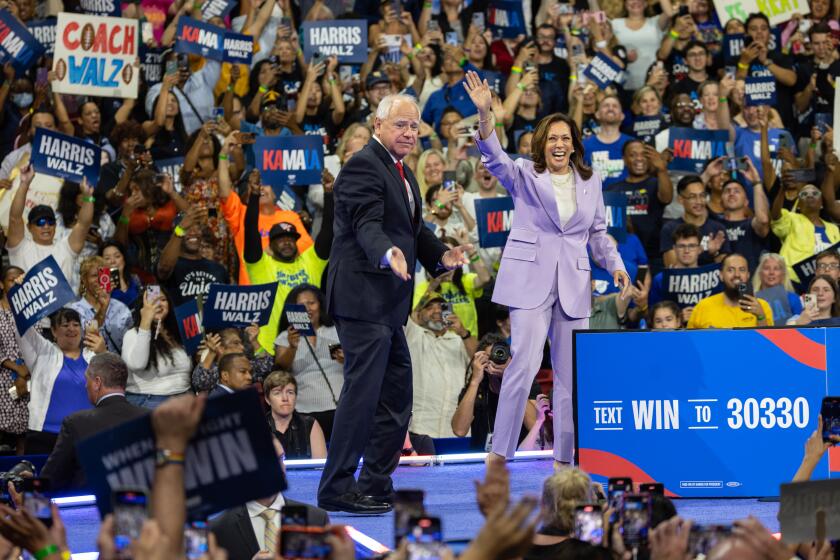Patches to California’s yawning budget gap are OKd
State lawmakers passed the last piece of a deficit-cutting package Thursday but put off many tough financial decisions until summer, hoping an economic rebound will ease the path to a balanced budget.
The legislation they approved would skirt restrictions on how gasoline taxes can be used, freeing an estimated $1.1 billion to help reduce the $20-billion shortfall. The measure would not change what drivers pay at the pump.
A handful of other bills passed in recent weeks would reduce the state worker payroll, suspend dozens of local programs and cut costs in the prison system. The total package would take a $4-billion bite out of the deficit, according to lawmakers.
Gov. Arnold Schwarzeneggerhas not said publicly whether he will sign the measures.
Senate leader Darrell Steinberg (D-Sacramento) touted the package as “a very good down payment,” while acknowledging that the coming summer’s budget choices will nevertheless pose “a great challenge.”
With the budget hole so deep and few signs pointing to a bullish recovery, some economists criticized the wait-and-see approach.
“The problem is not anywhere near going away,” said Steve Levy, director of the Center for Continuing Study of the California Economy.
Weary from deep spending cuts last year that ballooned class sizes, furloughed state workers and reduced programs for the poor, the Democrats who dominate the Legislature have defendedtheir refusal to further slash services.
“The idea that we would cut what’s basically been left on life support when there might be some other options. . .down the line was just not acceptable to us,” former Assembly Speaker Karen Bass (D-Los Angeles) said last week.
The Democrats are pinning their hopes on recent strong tax collections, which outpaced projections by more than $1 billion in January, the latest figures available. Steinberg said in a recent speech to the Sacramento Press Club that extra revenue could be up to $3 billion by summer.
“I am not willing to wade into cutting health and human services and education deeper as our first budget act in 2010,” he said.
Matt David, Schwarzenegger’s communications director, said Thursday that the governor remained undecided on the latest budget patches because “the Legislature failed to address job creation” in the package.
But Schwarzenegger, who in two rounds of budget talks last year demanded that lawmakers address the entire deficit at once, has this year largely withheld the kind of withering attacks on the Legislature that marked most of 2009.
The plan lawmakers passed Thursday would change how gas taxes are collected to avoid voter-approved requirements on how they must be spent. By swapping sales taxes for excise taxes, the complex maneuver would allow money to be diverted from mass transit, such as bus and rail lines, to shrink the deficit.
The package would leave intact some funding for mass transit, unlike Schwarzenegger’s January budget proposal.
The largest spending cut in the overall plan is a proposed $811-million reduction in California’s prison medical system, which has been troubled by cost overruns for years. But lawmakers offered no specifics on how the money, more than 40% of the prisons medical budget, would be saved.
Clark Kelso, the inmate healthcare czar appointed by federal courts, said he supported the cuts as a “target.”
“Is it a realistic figure? I’ll give a half-answer: It’s not an unrealistic figure,” Kelso told reporters last week.
Democrats say $182 million more would be saved if the governor commuted the sentences of 8,500 illegal immigrant inmates and turned them over to the federal government. The Schwarzenegger administration has said it will commute sentences for one-tenth of those prisoners, saving $17 million.
Other elements of the package would slice 5% from employee payrolls, saving $580 million, and suspend dozens of local programs, saving more than $230 million. Money for state-run centers that serve the developmentally disabled would be cut by 3%, saving $60 million.
Much of the other proposed savings would come through accounting shifts. A bid to require online retailers, such as Amazon.com, to collect sales taxes from California customers remains on hold in the Legislature.
The budget bills passed largely without support from Republicans, who wanted more cuts. They have not outlined a deficit-reduction plan of their own.
“The California ship of state is taking on water at an alarming rate, and it is going down in icy waters,” said Assemblyman Chuck DeVore (R-Irvine), a U.S. Senate candidate. The new proposals “will do virtually nothing to solve the problem,” he said.
Levy, the economist, urged more action sooner: “Every month they wait, they lose the chance to cut some spending and collect some revenue.”
More to Read
Get the L.A. Times Politics newsletter
Deeply reported insights into legislation, politics and policy from Sacramento, Washington and beyond. In your inbox three times per week.
You may occasionally receive promotional content from the Los Angeles Times.










